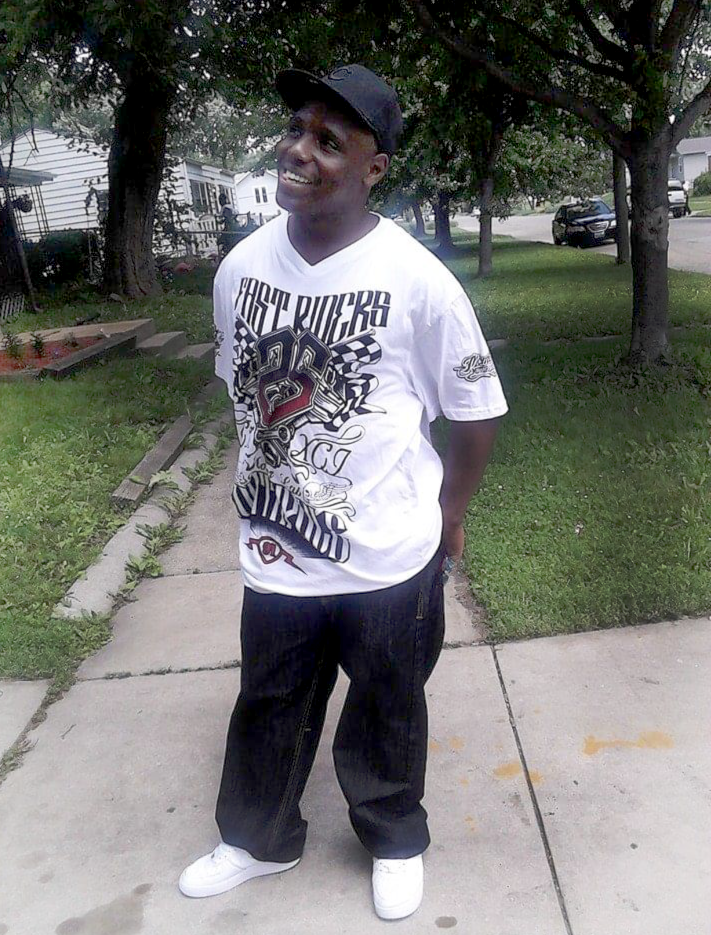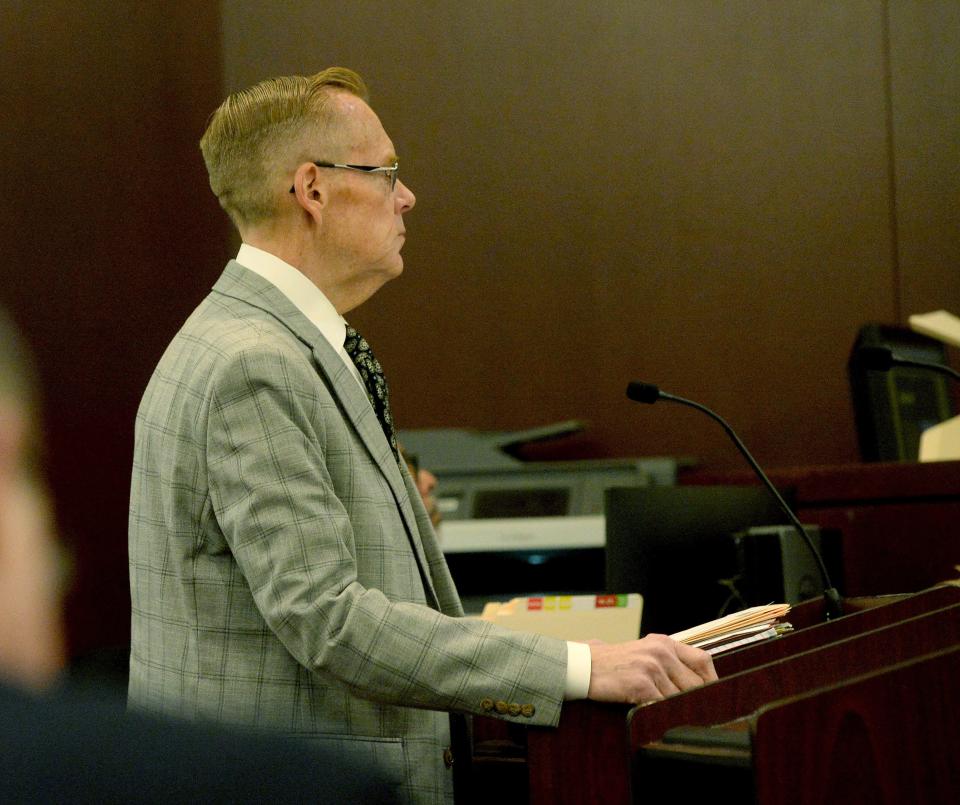Noting seriousness of the charges, judge rejects bond reduction request of EMS workers
A Sangamon County judge Monday ruled against efforts by two Springfield emergency medical services workers charged with first-degree murder to have their bonds reduced.
Circuit Judge Robin Schmidt said the seriousness of the charges against LifeStar Ambulance Service, Inc. workers Peggy Jill Finley and Peter J. Cadigan of Springfield, accused in the murder of Earl L. Moore Jr., 35, warranted the $1 million bonds staying in place.
Handcuffed and wearing Sangamon County Jail-issued uniforms, Finley and Cadigan had to file past about 35 members of the family of Moore, who died of compression and positional asphyxia at HSHS St. John's Hospital on Dec. 18, at Monday's hearing.
More:Timeline: What we know about Earl L. Moore Jr.'s death and events that followed
Meanwhile, new details of the case, specifically dealing with timelines and Moore's condition when he arrived at St. John's, were disclosed Monday.
Finley, a paramedic, and Cadigan, an EMT, responded to Moore's North 11th Street home. The State has alleged they strapped Moore tightly to a gurney and then slammed his face into the prone position, which is how he was transported to the hospital. Footage from body cameras worn by three Springfield Police officers was released to the public.
Finley, 44, and Cadigan, 50, pleaded not guilty at a probable cause hearing on Jan. 20.
Schmidt, overseeing procedures for the first time in the case which has gained national media attention, said there was an "inherent risk" that neither of the defendants would appear at future court dates.
Both attorneys for the defendants said their clients weren't dangers to the public and weren't flight risks.
Sangamon County State's Attorney Dan Wright countered that the $1 million bonds for Finley and Cadigan were among the lowest of anyone accused of first-degree murder being held in the county jail.
Wright argued that any release on bond with conditions "represents a promise to this court and reflects a certain measure of belief in the defendants' credibility and trust."
A series of false statements made by Finley and Cadigan to the Illinois State Police and outlined in the Jan. 20 preliminary hearing, Wright added, worked against the court placing "any trust in the defendants to comply with those conditions."
Cadigan's attorney, Justin Kuehn of Belleville, moved that Cadigan be released without a bond or if it was lowered, that it should be no more than $50,000. He said Cadigan also was amenable to wearing an electronic device or be subject to home monitoring.
Nothing in Cadigan's past, Kuehn added, revealed "a violent propensity."
Noting Finley's work record and her ties to the community, Springfield attorney W. Scott Hanken insisted that she be let out on a recognizance bond. Hanken asked Schmidt that Finley's bond be set at $100,000 otherwise.

As in his Jan. 18 motion to reduce bond, Hanken called the $1 million bond "oppressive" and "unconstitutional."
"It's not mandated. It's not warranted," Hanken said during the proceeding.
While Schmidt said she heard "no reliable evidence" that either defendant was planning to flee, she had to take into consideration "the nature of the seriousness of the charge" in denying the reduction of bonds.
"The reality of the current situation is that this case is only charged one way and that is first-degree murder," Schmidt said.
Hanken Monday continued to suggest that he didn't think Finley "was accountable for any actions (regarding Moore's death). That's not to suggest that Mr. Cadigan's actions were criminal."
Finley and Cadigan face 20 to 60 years behind bars if convicted.
Other new evidence came out in court Monday.
Wright said the ISP investigation indicated that Finley and Cadigan claimed that Moore had a blood pressure at St. John's around 140/80.
"St. John's staff categorically refuted that statement," Wright said.
Additionally, Finley and Cadigan told a LifeStar colleague, Wright added, that it took hospital personnel 20 minutes to begin the assessment and treatment of Moore.
Federal judge's order demands answers from Springfield man convicted in Jan. 6 breach
"The records from St. John's and the statements of St. John's staff indicate Mr. Moore coded approximately 10 minutes after arrival at ER (around 2:30 a.m.), so obviously the defendants' timeline is therefore impossible," he said. "It represents another lie, another false exculpatory statement reflecting consciousness of guilt."
Hanken countered the suggestion that Moore was "essentially unresponsive and dead when he arrived (at the hospital) is categorically untrue.
"The records show there were multiple efforts, injections of different drugs, CPR, active treatment going on," Hanken added. "That timeline (from St. John's) is suggestive of things that are not part and parcel of the State's argument."
Attorney Jennifer Hightower, representing Moore's estate and family, reminded the court during a short presentation that Moore was "not a name on a piece of paper. He wasn't a viral video. He was a person."
Several of Moore's immediate family, including his mother, Rosena Washington, and his sisters, Chatara Moore and Mahogany Moore, were in the courtroom, along with Springfield NAACP Branch and Illinois President Teresa Haley.
Hightower said it was the first time the family had been in the presence of Finley and Cadigan.
"Obviously, it's difficult. It was an emotionally charged courtroom," said Hightower of the Corpus Christi, Texas, firm Hilliard Martinez Gonzales. "The family is grieving. This is hard for (the Moore family) to wrap their minds around, the fact that Earl Moore is gone, the fact that their son, their uncle, their brother, their nephew is gone and he's never coming back."

After the hearing, Hanken said he was "very, very disappointed" with Schmidt's ruling.
"I respect the judge. I respect the job she has to do," Hanken added. "This is a case that has a lot of eyes on it.
"A bond hearing is not a trial. I'll state what I stated when this began. I've been doing this (33 years), and I've never seen anything like this before in my life. It's our intention to go forward and go to trial. We believe the law and the facts are on our side and we'll prevail. How we get there now is a little different story with Ms. Finley in custody and her limited means, we'll see what we can do."
Hightower said the family was "very pleased" that the bonds will be kept in place.

"We believe the bond is appropriate," she said.
Finley and Cadigan, along with LifeStar, were named in a wrongful death lawsuit, also filed in Sangamon County court by noted civil rights attorney Ben Crump. Hightower, who is part of the civil suit as well, said the defendants have been served in that case and that LifeStar is now being represented by a Chicago law firm.
A March 20 procedural status hearing was set Monday, but that may be more perfunctory towards setting a date to argue motions filed in the case.
A motion filed last week by the State alleged that Finley attempted to influence the recollection of one of the three Springfield Police officers who responded to Moore's residence, according to an ISP investigation.
Attorney, Jennifer Hightower: Earl Moore Jr. was ‘more than a viral video.’ Moore was a homicide victim in Springfield, Ill., on Dec. 18. Two EMS workers have been charged with first-degree murder. Hightower was speaking outside of a Springfield courtroom Monday. #SJRbreaking pic.twitter.com/qifxVfzBiW
— Steven Spearie (@StevenSpearie) February 7, 2023
Contact Steven Spearie: 217-622-1788, sspearie@sj-r.com, twitter.com/@StevenSpearie.
This article originally appeared on State Journal-Register: Bonds of EMS workers accused in a Springfield murder case won't be reduced

